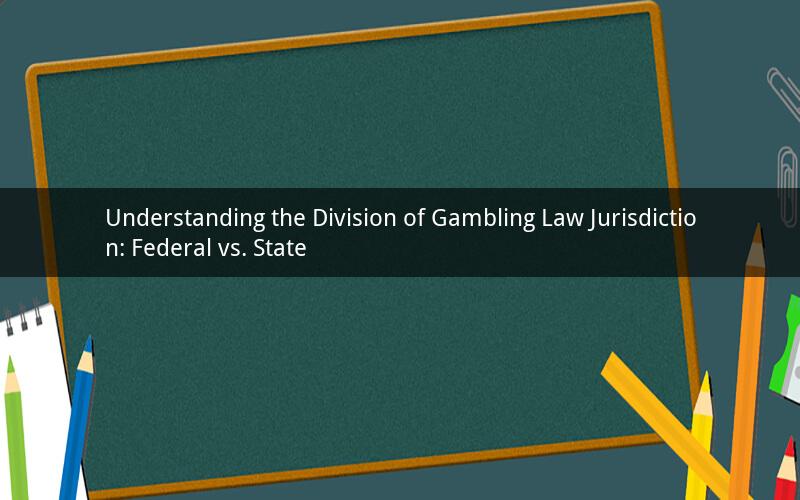
Gambling laws are a crucial aspect of legal regulation in any country, and the division of jurisdiction between federal and state levels plays a significant role in shaping these laws. In the United States, for instance, both federal and state governments have the authority to regulate gambling activities. However, the extent of their jurisdiction varies, leading to a complex legal landscape. This article delves into the differences between federal and state gambling laws, their implications, and the entities responsible for enforcing them.
I. Overview of Federal and State Gambling Laws
A. Federal Gambling Laws
Federal gambling laws in the United States are primarily governed by the Federal Wire Act of 1961 and the Unlawful Internet Gambling Enforcement Act (UIGEA) of 2006. The Federal Wire Act prohibits the use of wire communication facilities in the transmission of bets or wagers related to sporting events or contests. The UIGEA, on the other hand, aims to make it more difficult for individuals to engage in online gambling by requiring financial institutions to block or return funds associated with illegal Internet gambling.
B. State Gambling Laws
State gambling laws vary widely across the United States, as each state has the authority to regulate gambling within its borders. Some states have adopted a liberal approach, allowing for a variety of gambling activities, while others have restricted or banned gambling altogether. State laws typically cover land-based casinos, racetracks, lotteries, and online gambling.
II. Entities Responsible for Enforcing Gambling Laws
A. Federal Agencies
The primary federal agencies responsible for enforcing gambling laws include the Federal Bureau of Investigation (FBI), the United States Department of Justice (DOJ), and the Financial Crimes Enforcement Network (FinCEN). The FBI investigates violations of federal gambling laws, while the DOJ enforces these laws and brings legal actions against individuals and organizations involved in illegal gambling activities. FinCEN plays a role in monitoring financial transactions related to gambling and ensuring compliance with the UIGEA.
B. State Agencies
State agencies responsible for enforcing gambling laws vary depending on the specific state. In some states, the responsibility falls under the purview of the state lottery commission, while in others, it is handled by a separate gambling commission or department. These state agencies are tasked with overseeing gambling operations, licensing operators, and enforcing state gambling laws.
III. The Division of Jurisdiction: Federal vs. State
A. Federal Jurisdiction
Federal jurisdiction over gambling laws is limited to specific areas, such as the Wire Act and the UIGEA. The Federal Wire Act primarily targets the transmission of bets or wagers related to sporting events and contests, while the UIGEA focuses on online gambling. Federal laws do not directly regulate the operation of casinos, racetracks, or lotteries within individual states.
B. State Jurisdiction
State jurisdiction over gambling laws is much broader, as each state has the authority to regulate gambling within its borders. This includes the operation of casinos, racetracks, lotteries, and online gambling. States can choose to allow, restrict, or ban gambling activities, and they have the power to enforce their own gambling laws.
IV. Implications of the Division of Jurisdiction
A. Legal Landscape
The division of jurisdiction between federal and state levels creates a complex legal landscape for gambling laws. This complexity can lead to inconsistencies and conflicts between federal and state laws, as well as challenges in enforcement.
B. Regulatory Challenges
The division of jurisdiction also presents regulatory challenges. Federal agencies must coordinate with state agencies to ensure compliance with both federal and state gambling laws. This can be particularly difficult in cases involving online gambling, where the lines between federal and state jurisdiction are often blurred.
V. Key Questions and Answers
1. Question: Which federal law primarily targets the transmission of bets or wagers related to sporting events and contests?
Answer: The Federal Wire Act of 1961.
2. Question: What is the primary goal of the Unlawful Internet Gambling Enforcement Act (UIGEA)?
Answer: To make it more difficult for individuals to engage in online gambling by requiring financial institutions to block or return funds associated with illegal Internet gambling.
3. Question: How do state agencies differ in their approach to enforcing gambling laws?
Answer: State agencies responsible for enforcing gambling laws vary depending on the specific state. Some states have a lottery commission, while others have a separate gambling commission or department.
4. Question: Can a state completely ban gambling within its borders?
Answer: Yes, states have the authority to completely ban gambling within their borders.
5. Question: What are the primary challenges faced by federal agencies in enforcing gambling laws?
Answer: Federal agencies face challenges in coordinating with state agencies, ensuring compliance with both federal and state laws, and addressing the complexities of online gambling.
In conclusion, the division of jurisdiction between federal and state levels in gambling law regulation is a crucial aspect of legal governance. While federal laws primarily target specific areas, such as the Wire Act and the UIGEA, state laws cover a broader range of gambling activities. Understanding the roles of federal and state agencies in enforcing these laws is essential in navigating the complex legal landscape of gambling regulations.